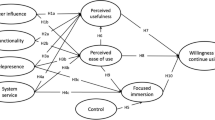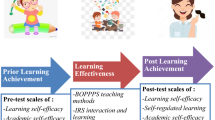Abstract
This study intends to explore the influence of innovative teaching approach toward attitude, knowledge acquisition, intention, and learning satisfaction. The innovative teaching approach combines external resources to design interesting and interactive curriculums for stimulating students’ imagination, cultivating the ability of problem solving, and facilitating independent thinking. We adopted the concepts of open innovation and technology acceptance model to develop our framework. A total of 109 questionnaires were filled out by sixth grade students, who have complete the curriculum, in Si-Men Primary school, with 109 valid responses returned. At first, we found that the open innovative teaching approach appeared to have a positive influence on students’ learning attitude and knowledge acquisition. Second, better learning attitudes and knowledge acquisition had positive influence on learning intention. Third, learning intention increased student satisfaction of learning. In addition, we also verified the attitude and knowledge acquisition played as mediator between open innovative teaching approach and learning intention. Therefore, we believe that interesting and interactive approaches may foster a stronger motivation to learn new skills, acquire knowledge and increase student learning satisfaction.


Similar content being viewed by others
References
Al-Gahtani, S.S., King, M.: Attitudes, satisfaction and usage: factors contributing to each in the acceptance of information technology. Behav. Inf. Technol. 18(4), 277–297 (1999)
Barney, J.: Firm resources and sustained competitive advantage. J. Manag. 17(1), 99–120 (1991)
Baron, R.M., Kenny, D.A.: The moderator-mediator variable distinction in social psychological research: conceptual, strategic, and statistical considerations. J. Pers. Soc. Psychol. 51(6), 1173–1182 (1986)
Benavides-Velasco, C.A., Quintana-Garcia, C.: Innovative competence, exploration and exploitation: the influence of technological diversification. Res. Policy 37(3), 492–507 (2008)
Benner, M.J., Tushman, M.L.: Exploitation, exploration, and process management: the productivity dilemma revisited. Acad. Manag. Rev. 28, 238–256 (2003)
Breer, P.E., Locke, E.A.: Task Experience as a Source of Attitudes. Dorsey, Homewood (1965)
Bybee, J.W., Landes, N.M.: The biological sciences curriculum study. Sci. Child. 25(8), 36–37 (1988)
Cavone, A.: Management style in industrial R&D organizations. Eur. J. Innov. Manag. 3(2), 59–71 (2000)
Cheong, J.H., Park, M.C.: Mobile internet acceptance in Korea. Internet Res. 15(2), 125–140 (2005)
Chesbrough, H.W.: Open Innovation: The New Imperative for Creating and Profiting from Technology. Harvard Business School Press, Boston (2003)
Compton, P.: Situated cognition and knowledge acquisition research. Int. J. Hum. Comput. Stud. 7(2), 184–190 (2013)
David, B., Ruth, D., Sampson, J.: Peer learning and assessment. Assess. Eval. High. Educ. 24(4), 413–426 (1999)
Davis, F.D., Bagozzi, R.P., Warshaw, P.R.: User acceptance of computer technology: a comparison of two theoretical models. Manag. Sci. 35(8), 982–1002 (1989)
Davis, F.D., Bagozzi, R.P., Warshaw, P.R.: Extrinsic and intrinsic motivation to use computers in the workplace. J. Appl. Soc. Psychol. 22(14), 1111–1132 (1992)
Eagly, A., Chaiken, S.: Attitude Strength: Antecedents and Consequences. Lawrence Erlbaum, Mahwah (1995)
Fishbein, M., Ajzen, I.: Belief, Attitude, Intention, and Behavior: An Introduction to Theory and Research. Addison-Wesley, Reading (1975)
Fornell, C., Larcker, D.F.: Evaluating structural equation models with unobservable variables and measurement error. J. Market. Res. 8, 39–50 (1981)
Goodman, P., Baloff, N.: Task experience and attitudes towards decision making. Organ. Behav. Hum. Perform. 3(2), 202–216 (1968)
Grant, R.M.: The Resource-based Theory of Competitive Advantage: Implications for Strategy Formulation, pp. 114–135. California Management Review of Accounting Studies (1991)
Grant, R.M.: Toward a knowledg-based theory of the firm. Strateg. Manag. J. 17, 109–122 (1996)
Hair, J.F., Anderson, R.E., Tatham, R.I., Black, W.C.: Multivariate Data Analysis with Readings. Paulist press, New York (1998)
Hayashi, A., Chen, C., Ryan, T., Wu, J.: The role of social presence and moderating role of computer self-efficacy in predicting the continuance usage of e-learning systems. J. Inf. Syst. Educ. 15(2), 139–154 (2004)
Jansen, J.J.P., Van Den Bosch, A.J., Volberda, H.W.: Exploratory innovation, exploitative innovation, and performance: effects of organizational antecedents and environmental moderators. Manag. Sci. 52(11), 1661–1674 (2006)
Jansen, J.J.P., Tempelaar, M.P., Van den Bosch, F.A.J., Volberda, H.W.: Structural differentiation and ambidexterity: The mediating role of integration mechanisms. Organ. Sci. 20(4), 797–811 (2009)
Kogut, B., Zander, U.: Knowledge of the firm and the evolutionary theory of the multinational corporation. J. Int. Bus. Stud. 24(4), 625–645 (1993)
Koufaris, M.: Applying the technology acceptance model and flow theory to online consumer behaviour. Inf. Syst. Res. 13(2), 205–223 (2002)
Levinthal, D.A., March, J.G.: The myopia of learning. Strateg. Manag. J. 14, 95–112 (1993)
Li, C.R., Lin, C.J., Chu, C.P.: The nature of market orientation and the ambidexterity of innovations. Manag. Decis. 46(7), 1002–1026 (2008)
Lu, H., Alison, E., While, K.L.B.: Job satisfaction among nurses: a literature review. Int. J. Nurs. Stud. 42, 211–227 (2005a)
Lu, J., Yao, J.E., Yu, C.S.: Personal innovativeness, social influences and adoption of wireless internet services via mobile technology. J. Strateg. Inf. Syst. 14(3), 245–268 (2005b)
March, J.G.: Exploration and exploitation in organizational learning. Organ. Sci. 2, 71–81 (1991)
Moon, J.W., Kim, Y.G.: Extending the TAM for a World-Wide-Web context. Inf. Manag. 38(4), 217–230 (2001)
Neter, J., Kutner, M.H., Nachtsheim, C.J.: Applied Linear Regression Models. Burr Ridge, Illinois (1996)
Patterson, P.G.: The determinants of satisfaction/dissatisfaction for business-to-business, professional services: a conceptual model. Adv. Serv. Market. Manag. 169–193 (1995)
Plouffe, C.R., Vandenbosch, M., Hulland, J.: Intermediating technologies and multi-group adoption: a comparison of consumer and merchant adoption intentions toward a new electronic payment system. J. Prod. Innov. Manag. Decis. 18(2), 65–81 (2001)
Prahalad, C., Hamel, G.: The core competencies of the corporation. Harvard Bus. Rev. 66, 79–91 (1990)
Rice, R.W., Phillips, S.M.: Multiple discrepancies and pay satisfaction. J. Appl. Psychol. 75(4), 386–393 (1990)
Robertson, T.S., Gatignon, H.: Competitive effects on technology diffusion. J. Market. 50(3), 1–12 (1986)
Rogers, E.M.: Diffusion of Innovations. Free Press, New York (2003)
Selznich, P.: Leadership in Administration: A Sociological Interpretation. University of California Press, Berkeley (1957)
Srinivasan, A.: Alternative measures of system effectiveness associations and implication. MIS Q. 9(3), 243–253 (1985)
Suh, B., Han, I.: Efect of trust on customer acceptance of internet banking. Electron. Commer. Res. Appl. 1, 247–263 (2002a)
Suh, B., Han, I.: Effect of trust on customer acceptance of internet banking. Electron. Commer. Res. Appl. 1(1), 247–263 (2002b)
Taylor, S., Todd, P.A.: Understanding information technology usage: a test of competing models. Inf. Syst. Res. 6, 144–176 (1995)
Wernerfelt, B.: A resource-based view of the firm. Strateg. Manag. J. 5, 171–180 (1984)
Author information
Authors and Affiliations
Rights and permissions
About this article
Cite this article
Lee, PC., Lin, CT. & Kang, HH. The influence of open innovative teaching approach toward student satisfaction: a case of Si-Men Primary School. Qual Quant 50, 491–507 (2016). https://doi.org/10.1007/s11135-015-0160-x
Published:
Issue Date:
DOI: https://doi.org/10.1007/s11135-015-0160-x




